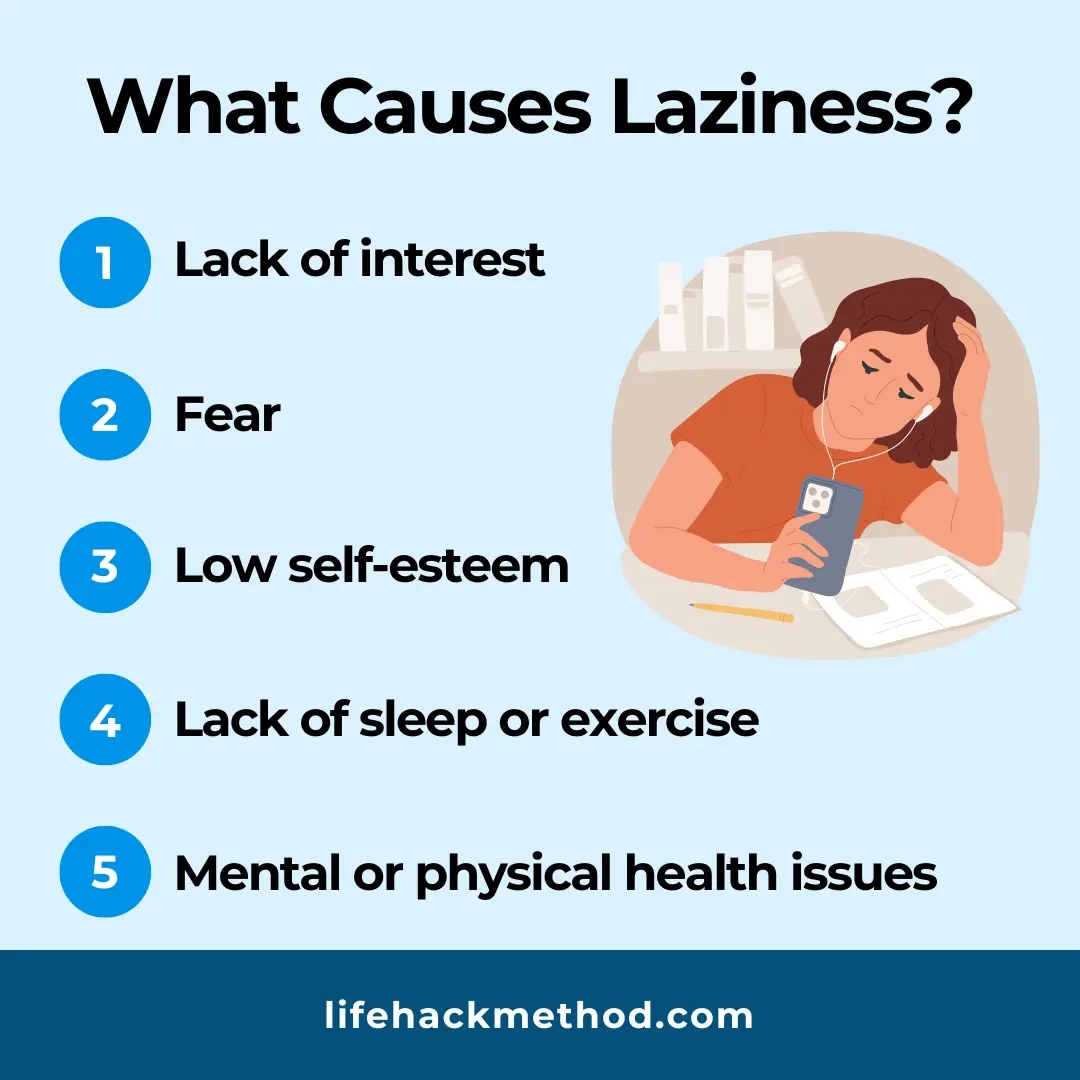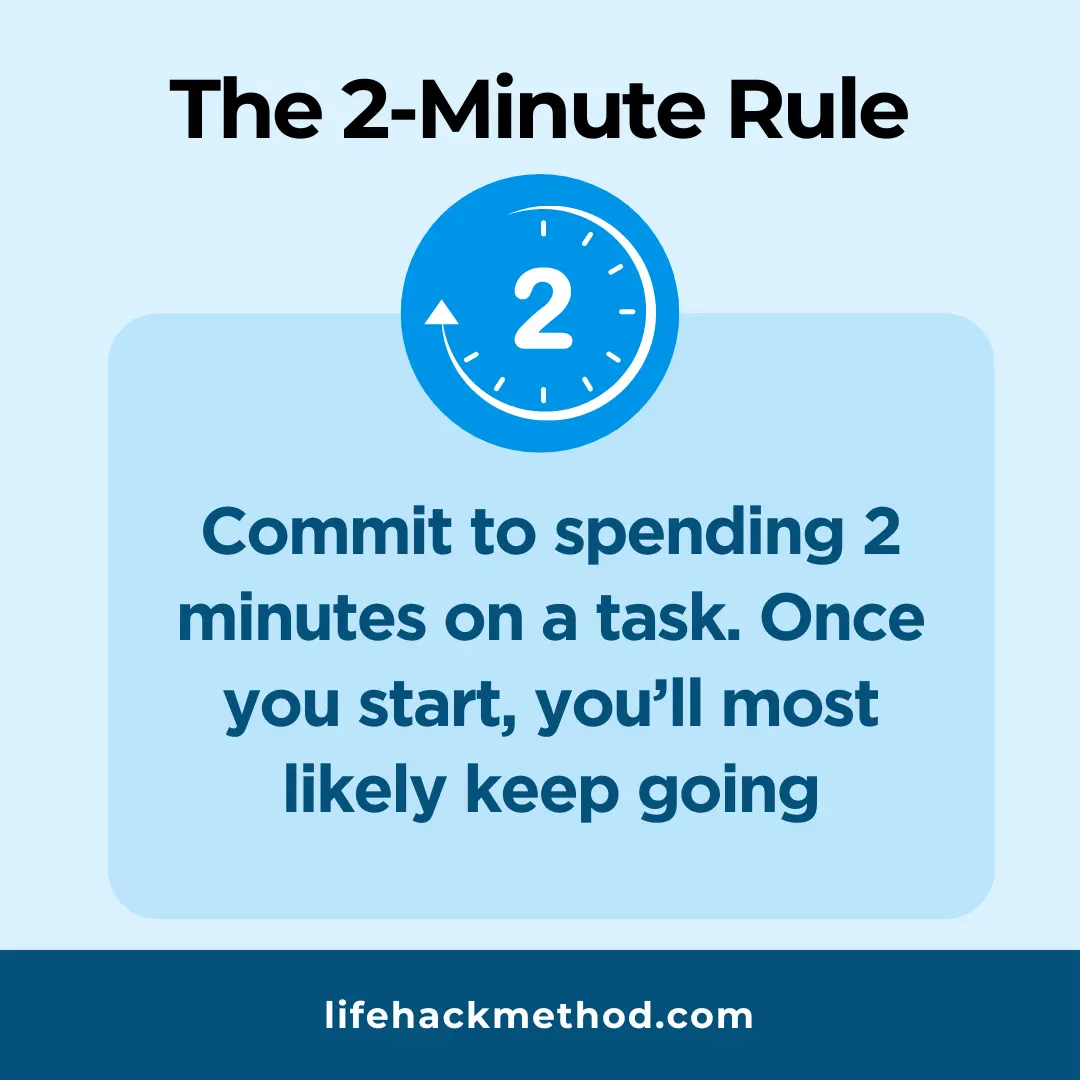So, how do you stop being lazy?
Here’s what you need to know.
Quick overview:
- Set achievable goals
- Cultivate grit
- Start small
- Focus on progress
- Reward yourself
What is laziness?
The textbook definition of lazy is “the quality of not being willing to work or use any effort.”
The truth is, very few people are truly lazy. Sure, we all have those days where we can’t get motivated for the life of us, and even though we’re working, it feels like no work is getting done. We focus on non-pressing, menial tasks to avoid tackling the big, important ones.
If that sounds like you, you’re not alone – 85% of people say they could be more productive with their time.

For instance, “lazy” people (those who aren’t as physically active) are smarter than non-lazy people. It can also reduce the need for medical attention by 43%.
Still, laziness can be detrimental and increase our anxiety, worsen our moods, and hurt our well-being.
But why are we lazy? And how can we stop being lazy?
Keep reading to find out.
What are the main causes of laziness?
To stop being lazy, you have to know why you lack motivation and energy.
And the truth is, we’re rarely lazy just because we want to be.
Laziness can actually stem from several different factors, including our mental health, physical health, and emotions.
With that in mind, let’s take a close look at the main causes of laziness.

1. Lack of interest
When a task is uninteresting or boring, it drains your energy and makes focusing harder. After all, your brain craves novelty.
But if a task doesn’t have that novelty or offer a sense of purpose, you start to wonder if it’s worth starting, much less finishing.
And that sense of pointlessness? It leads straight to laziness because you don’t have the willpower to even try, so you continue to put it off or don’t do it at all.
2. Fear
It’s natural to be afraid to try new things – but that fear of failure can often lead to laziness.
Why?
Because when you’re so focused on avoiding the feeling of failure or being uncomfortable, you often take no action at all in order to protect yourself.
But it’s not just about failure. Some people fear success and the expectations that come with it.
So, in turn, they self-sabotage by procrastinating or avoiding tasks altogether to stay in their comfort zone.
3. Low self-esteem
Low self-esteem drives laziness because it undermines your self-confidence and belief in yourself.
This causes you to doubt your abilities and struggle to even imagine that you can be successful.
And, in turn, you choose not to take action.
That creates a toxic cycle of laziness that reinforces your feelings of worthlessness and reduces your sense of motivation even further.
The American Psychology Association found that students with low self-esteem were “hesitant to engage in learning or take appropriate academic growth risks” – which takes the form of laziness.
4. Lack of sleep or exercise
Often, sleep is associated with laziness. But the right amount of it is crucial if you want to stop being lazy.
When you don’t get enough sleep, your cognitive function decreases, and paying attention, performing multi-step tasks, and making decisions become nearly impossible.
Exercise is also important.
Without enough of it, your stamina and physical fitness both deteriorate, which leads to tiredness, a lack of energy, and less endorphins.
All of those negatively impact your mood and motivation.
And if you don’t have enough sleep or exercise?
It creates a cycle of laziness that’s hard to break because you won’t have the energy or the mental function to overcome it.
5. Mental or physical health issues
Sometimes, your laziness isn’t your fault. It could be health-related.
Some health issues that lead to laziness include:
- Alzheimer’s disease
- Anxiety
- Apathy
- Bipolar disorder
- Depression
- Posttraumatic stress disorder (PTSD)
- Premenstrual dysphoric disorder (PDD)
- Traumatic brain injury
Your diet could be playing a part in your laziness, too.
Research has found that eating too many processed foods and carrying extra weight can lead to lethargy, inactivity, and, yes, laziness.
But nutrients play an important part, too.
Here are a few vitamin deficiencies that can also lead to laziness:
- B12
- C
- D
- Folate
- Iron
- Magnesium
Now that you know the causes of laziness, you might be wondering how to stop being lazy.
Keep reading to find out!
18 ways to overcome laziness
You can only find a way to stop being lazy once you’ve figured out why you’re being lazy.
And oftentimes, figuring out how to stop being lazy calls for finding ways to transform your habits and enhance your motivation and productivity.
It sounds like a big ask, but it can be simple!
Let’s dive into the best ways to stop being lazy.
1. Set achievable goals
Goals help you figure out what you want to achieve, stay focused, and, most importantly, increase your motivation.
But 92% of people don’t achieve their goals.
Why?
Because they’re too lofty, which makes it hard to follow through.
That’s why SMART goals (Specific, Measurable, Achievable, Relevant, Time-bound) are so great.

At the start of the day, our energy is at its highest level, and we are able to be most effective, but as the day wears on, ‘decision fatigue’ starts to set in, and we become less and less focused.
Commit to your plans when your mind is fresh at the start of the day, and stick to your goals.
And write them down!
Studies show that writing down your goals makes you 42% more likely to achieve them.
Trust me, the feeling you get when you tick off the tasks you’ve completed will be extremely motivating.
I talk more about goals here:
2. Cultivate grit
Highly effective people have cultivated the ability to keep working toward their goals, even when they feel discouraged.
They have simply learned techniques to lean into their perseverance.
One of my favorite motivational researchers, Angela Duckworth, describes the characteristic of persistence as grit.
Grit is the “passion and perseverance for long-term and meaningful goals.”
In other words, grit is staying focused, not giving up, and continuing to work hard despite obstacles or feeling stuck because you care about a goal.
To cultivate grit, you need to use four key principles:
- Interest: What are the things about your task that make you curious?
- Practice: Habits are powerful, and good habits are formed by repetition, so build your practice right into your daily schedule.
- Purpose: It’s easier to get motivated to do short-term tasks if you keep the finish line in mind. What is your ultimate goal?
- Faith: Positive inner dialogue is very important. The voice in your head should be reminding you that you are a winner.
3. Start small
Starting imperfectly is better than not starting at all.
It’s easy enough to go back and fix your mistakes later, but putting off starting something isn’t going to make it work better. Perfectionism can be a destructive characteristic if we don’t counteract it with a willingness to make mistakes.
It can be as simple as creating a basic routine that incorporates small, productive actions, like making your bed every morning, spending five minutes tidying your desk, or planning your week ahead of time.
Or you can try the “Two-Minute Rule,” which is perfect for helping you actually get started. Let’s say you have to clean the kitchen – commit to spending two minutes wiping down the countertops. Chances are, you’ll keep going!

4. Focus on progress
Research shows that when you set a goal, focusing on your progress increases your likelihood of achieving it.
And the more often you check your progress, the chances you’ll be successful are even higher!
Why?
Because completing a task, no matter how small, helps you stop being lazy by making the bigger picture seem less intimidating.
5. Reward yourself
Dangle a carrot as a reward.
If your mind knows it’s going to get a nice, juicy reward in exchange for getting going, it suddenly becomes a heck of a lot easier to start.
And you’ll be far more motivated and likely to repeat the behavior (in other words, you’ll stop being lazy) when you know you’ll get something out of it.
Examples of rewards could include a massage, a piece of chocolate, or a celebratory dinner with loved ones.
But remember, your goals have to be obtainable to be rewarding! For example, you wouldn’t reward yourself for running a 5K if you’re just starting out.
6. Assess how you spend your time
Examine the parts of your life where your time is being wasted.
Do you spend way too much time zoning out, scrolling through your social media?
We had a client who was struggling to find time to spend quality time with her husband and work out. She didn’t believe she’d be able to reclaim any of her time in her schedule.
Turns out – she was spending over 10 hours a week watching and reading the news!
Once she became aware of that, she spent that time in line with what she really wanted.
7. Balance your time and energy
Most of us can focus productively for a few hours at a time if we’re at full energy. But after that, fatigue sets in.
Personal energy is not a bottomless well.
It’s extremely important to create a lifestyle that charges up your energy reserves (for example, with the right daily routines, exercise, and healthy nutrition).
I call this practice self-resourcing.
Building a productive lifestyle is about balancing time and energy so that you can achieve your goals and stay motivated.
Most things worth doing take time and sustained effort. If you pour your energy into your tasks but neglect self-resourcing, sooner or later, you will burn out.
8. Break up big tasks into smaller ones
Big tasks can be overwhelming, so it’s important to break them up into smaller pieces that you can accomplish in a reasonable time.
Vague ambition is not motivating – motivation comes from being able to take specific action to reach your target.
Runners use this technique to overcome fatigue in a marathon.
Rather than focusing on the distant finish line, they set their sights on a landmark within visual range. When they reach that point, they choose another landmark to focus on, and so on.
When you set about planning your projects, deconstruct the big goals into tasks you can achieve in a single day, or a few hours.
9. Disconnect from social media
Take control of your device addiction.
If you would like to reclaim the time you lose to mindless phone-browsing every day, and put that time into achieving your goals, try Manoush Zomorodi’s bored and brilliant challenge.
Here’s how it works:
Delete all the social media apps from your phone, go cold turkey, and find out what happens when your idle mind is free to imagine, create, and ponder.
For me, disconnecting myself from the constant distractions of social media has had a really positive effect on my ability to focus. When I want to use social media for work I can login on my laptop but I set aside a specific time each day to do it so it doesn’t distract me all the time.
10. Use the 5-second rule
One of the most motivated (and motivating) people I know, Mel Robbins, has a simple principle that she calls ‘the five-second rule.’

Starting is everything. Once we take action, we are committed to an idea.
11. Have fun
I’ve talked a lot about effectiveness and productivity in this post, but now I want to switch it up a bit and focus on fun!
Being well organized is vital to conquering procrastination, but so is allowing FUN into your life. Without time away from work, your motivation is going to dwindle until it disappears completely.
Taking time away from work to rest, recharge, get creative and have fun actually makes you way more effective once you come back to your work.
12. Give yourself breaks
I know it sounds counterintuitive, but trust me on this.
Knowing when to take a break is crucial on your journey to stop being lazy.
Why?
Because they allow your brain to recharge and come back sharper than before, which will help you make better decisions and stay focused.
But it’s also a great way to reduce stress and avoid burnout, both of which lead to feelings of overwhelm, disengagement, and laziness.
13. Set up an accountability system
Creating an accountability system with friends, family, or coworkers creates a sort of external pressure that will help you stop being lazy.
The pressure isn’t a bad thing! Having someone in your corner will help keep you on track and motivate you to stop being lazy when you hit an obstacle.
Plus, sharing your goals with someone else will help strengthen your commitment to stop being lazy by instilling a sense of responsibility.
Put simply, you’re far less likely to abandon ship halfway through when you know people are watching.
14. Sleep enough
To stop being lazy, you have to be well-rested – and that means getting enough sleep (which, for adults, is at least 7 hours each night).
Without sleep, you become sluggish, and your reaction time, memory processing, and critical thinking all worsen. Completing a task starts to feel impossible.
And that’s just your mind!
Your body feels the lack of sleep, too, which can lead to:
- Less physical strength
- Compromised immune system
- Increased risk of disease and mental illness
- Mood swings
Creating positive sleep habits is very important because, without quality sleep, your mind and body can’t heal and recharge.
15. Meditate
Meditation can be incredibly helpful when you want to stop being lazy.
It helps you better understand yourself and why you’re being lazy, whether it’s fear, tiredness, or feeling overwhelmed.
And knowing what’s going on will help you address the problem and stop being lazy.
Meditation can also enhance your focus and motivation, which will help you continue to work toward your goals.
And finally, meditation is a great stress management tool.
It calms your mind, which allows you to take action more easily and approach whatever task is in front of you with greater energy and clarity.
16. Eat right and exercise
Giving your body the fuel it needs is the best advice you can get to stop being lazy.
The right kind of food, vitamins, and minerals will give you energy that lasts the entire day, which helps you avoid sluggishness and feel more motivated.
They can also help you with brain function and improve concentration and sharpness, making it easier to stay on track.
Here are a few foods that are helpful:
- Berries
- Bananas
- Fatty fish
- Nuts and seeds
- Dark chocolate
- Meat
And because it releases endorphins that help fight stress and anxiety, exercising also helps you stop being lazy and motivates you to get things done (even if your muscles are sore).
When you do both of these things regularly, you build momentum and eventually start applying healthier habits in other areas, which will help you stop being lazy in all aspects of your life!
17. Overcome analysis paralysis
Analysis paralysis is something that happens to all of us, and it tends to be an especially big problem for creative people who deal with complex tasks.
To understand analysis paralysis, it’s important to see that this mental block on our productivity actually comes from our desire to achieve great results.
Facing a complex task, our creative mind starts to analyze all the ways we could go about doing it, and instead of diving in and getting it done, we get caught in a feedback loop of anxiety. The longer we delay beginning, the more complicated the task ahead seems to become.
When you’re gripped by analysis paralysis, tell yourself that you’re just working on a first draft or taking the first step so that you start doing!
18. Have a clear mission
Finally, having a clear mission that aligns with your values is one of the best ways to stop being lazy.
A mission describes what you want to do and who you want to be. Knowing those two things instills meaning, motivation, structure, and accountability in your life because you’re actively working toward something.
It all comes together to create a sense of fulfillment in your life – and when you feel fulfilled, it becomes impossible not to take action.
Ultimatley, you can use laziness in your favor.
And that’s what I talk more about here:
What’s next?
There you have it. Now you know how you can stop being lazy – and that your “laziness” doesn’t mean you’re necessarily lazy to begin with.
However, overcoming bad habits, whatever their reason, and getting more productive requires rewiring your brain.
You need:
A plan. And you need someone holding you accountable.
And that’s exactly what we share in Lifehack Tribe.



